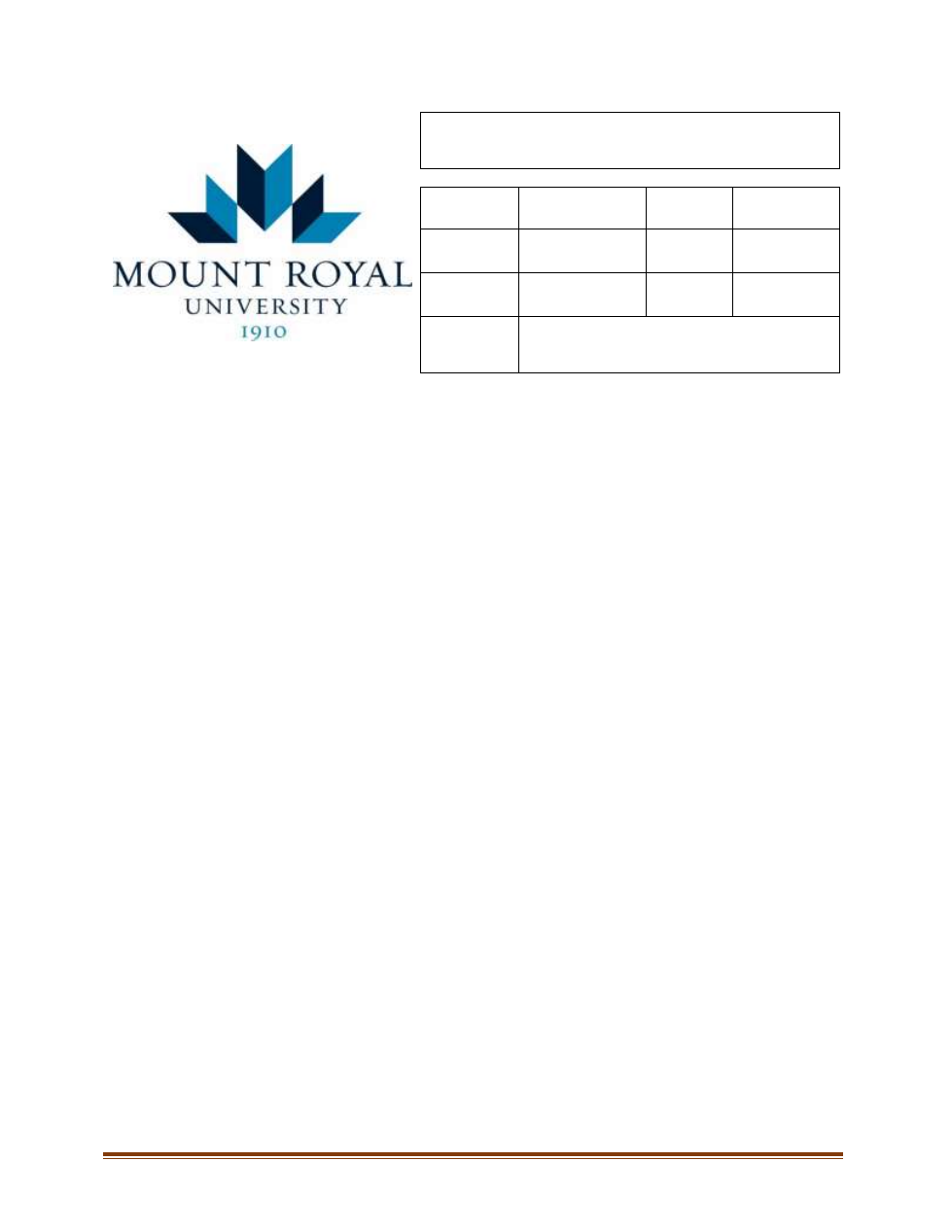
Off Campus Activity Safety Procedures
– May 27, 2013
Page 1 of 24
OFF CAMPUS ACTIVITY SAFETY POLICY
PROCEDURES
Procedure
Type:
Management
Initially
Approved:
May 27, 2013
Procedure
Sponsor:
General Counsel &
University
Secretariat
Last
Revised:
May 27, 2013
Primary
Contact:
Chief Safety, Risk
and Employee
Wellness Officer
Review
Scheduled:
October 10,
2023
Approver:
Executive Leadership Team
A. OVERVIEW
Mount Royal University (MRU) the “University” has a variety of unique off campus programs, and
opportunities for faculty, staff, and students that enhance the research and teaching aspects of the
University’s mandate. The University values the benefits of Off Campus activities and travel that allow
members of the University Community to broaden their experiences, expand and share their knowledge,
and encourage innovation and collaboration in support of the University’s mission.
Off Campus activities and travel introduce varying levels of Risk to those who participate in the activities.
The University is committed to supporting its Off Campus Activity Participants in planning and
participating in safe and educational off campus experiences.
These procedures provide a framework for the creation of internal controls and the assignment of
specific responsibilities to support the safe conduct of Off-Campus Activities.
B. PROCEDURES
1.
ASSESSING RISK ASSOCIATED WITH OFF CAMPUS ACTIVITY
1.1
The extent of advance planning, preparation and approvals required prior to embarking
on an Off Campus Activity is commensurate with the level of Risk associated with the
activity, and the role and experience of the Participants.
1.2
In relation to reoccurring activities, the Activity Coordinator/Principal Investigator should
ensure that, during the planning process, they consider changes in any relevant factors
that have occurred since the activity last took place.
1.3
Risk assessment requires the exercise of good judgment, based on expertise and
experience, and, where necessary, consultation with suitably qualified individuals. Risk
assessment is a process that involves:
a. Identifying Hazards associated with the activity;
b. Analyzing the Risk related to each of the Hazards; and,
c. Determining how to manage the Risks effectively.
1.4
Off Campus activities can pose manageable Risk (including Low-Risk, Higher-Risk and
High-Risk) or Unmanageable Risk to the Participants. For each Off Campus Activity, the

Off Campus Activity Safety Procedures
– May 27, 2013
Page 2 of 24
Activity Coordinator/Principal Investigator and the Faculty/Department Head must
undertake a Risk assessment. Unaccompanied Participants are responsible for
completing the initial Risk assessment, subject to the approval of the Faculty/Department
Head.
1.5
All off campus activities must be assessed for its level of Risk by considering the factors
set out in the Appendix A: Elevation of Risk.
1.6
Following the completion of a Risk assessment, the Faculty/Department Head must
decide whether or not the proposed activity is considered to be a manageable Risk or an
Unmanageable Risk. Low-Risk assessments must be performed with a copy of the
assessment provided to and approved by the Faculty/Department Head. Higher-Risk
assessments must be performed using the Form One, a completed copy of which must
be approved by the Faculty/Department Head. Completed High-Risk assessments must
be performed using the Form One, a completed copy of which must be reviewed and
signed by the Risk Management Office and approved by the Faculty/Department Head.
2.
MANAGEABLE RISK
2.1
Low-Risk Activities
a. Low-Risk Activities includes any activity that entails Hazards no greater than those
encountered by the Participants in their normal onsite campus-based activities is Low-
Risk. Minimal planning and preparation are required for such activities. If the Risk
assessment assists to conclude that the travel/activity is that of a Low-Risk nature,
Form One does not need to be completed.
b. Advanced briefing of Participants in low-Risk activities is required. Consultation with
the Risk Management Office is at the discretion of the Activity Coordinator/Principal
Investigator.
2.2
Higher-Risk Activities
a. Higher-Risk Activities includes any activity that has the potential to expose
Participants to Hazards that are greater than those likely to be encountered in their
normal onsite, campus-based activities. Activities which have any of the factors set
out in the Appendix A: Elevation of Risk should be considered a Higher-Risk Activity.
b. Form One must be completed by Principal Investigator/Activity Coordinator, and
approved by the appropriate authority.
c. Advanced activity briefing and orientation of Participants in higher-Risk activities is
required. Consultation with the Risk Management Office is at the discretion of the
Activity Coordinator/Principal Investigator.
2.3
High-Risk Requiring the Review of Risk Management
a. High-Risk Activities includes any activities which are identified in Form One as being
“High-Risk” activities. These are activities that have the potential to expose
Participants to Hazards that are significantly greater than those likely to be
encountered in their normal onsite, campus-
based activities. MRU’s insurers will
require the Activity Leader or Principal Investigator and the activity Participants to
have a higher level of preparation for these events. In some cases, MRU’s insurers

Off Campus Activity Safety Procedures
– May 27, 2013
Page 3 of 24
will not automatically provide insurance coverage for these activities and additional
coverage may need to be obtained by the Risk Management Office.
b. Form One must be completed by Principal Investigator/Activity Coordinator, reviewed
by the Risk Management Office and approved by the appropriate authority.
3.
UNMANAGEABLE RISK
3.1
Following the completion of a Risk assessment performed using Form One, the
Faculty/Department Head must decide whether or not the Risk associated with the
proposed Off Campus Activity is manageable through the use of planning, training or
preparation.
3.2
If the Faculty/Department Head concludes that the Risks associated with the proposed
Off Campus Activity cannot be effectively managed or mitigated, the activity must not
proceed.
3.3
The Faculty/Department Head should consult with the Risk Management Office for further
guidance and is encouraged to seek the approval of their appropriate Vice-President if
they are unclear regarding the appropriate assessment of the Risk.
4.
PROCEDURE FOR LOW-RISK ACTIVITIES
Action
Responsibility
1. Notification of group travel/activity plans to offer
a Low-Risk Off Campus Activity through the
Pre-Travel Authorization.
Activity Coordinator/Principal Investigator sends
memo to Faculty/Department Head for approval.
2. Risk assessment made and determined to be
Low-Risk
– after reviewing the factors in
Elevation of Risk.
Approved travel notification created by
coordinator and approved by Person in Authority.
Consultation with the Risk Management Office at
discretion of Activity Coordinator/Principal
Investigator.
3. Plan and prepare Participants for an Off
Campus Activity by providing an orientation or
briefing session.
See Operational Guidelines for Off Campus
Activity Safety Policy.
Activity Coordinator/Principal Investigator.
4. Proceed with Off Campus Activity and make
appropriate travel, accommodation, meal and
activity arrangement; include special
preparations for Participants with disabilities or
medical conditions.
See Academic Accommodation for Students
Experiencing Disabilities policy.
See Travel and Expense policy.
Activity Leader(s) or Unaccompanied Participant.
5. Report Critical Incidents to Security Services.
Assess the Risk for continuing the activity and
terminate the activity if the Risk is
Unmanageable.
Activity Leader(s) or Unaccompanied Participant
are responsible for reporting directly to Security
Services immediately. Security Services will
respond as per Emergency Response Plan under

Off Campus Activity Safety Procedures
– May 27, 2013
Page 4 of 24
Action
Responsibility
the direction of the Director of the Emergency
Operations Centre.
6. Debrief at the conclusion of the Off Campus
Activity by use of Form Two (recommended).
Activity Leader(s)/Participant(s).
7. Submit post-activity report only if a Critical or
Non-Critical Incident has occurred using Form
Three.
Activity Leader(s)/Participant(s)
Completed Form Three must be sent to the Risk
Management Office.
8. Maintain written documentation for all steps.
Activity Coordinator/Principal Investigator.
5.
PROCEDURE FOR HIGHER-RISK AND HIGH-RISK ACTIVITIES REQUIRING REVIEW BY
RISK MANAGEMENT
Action
Responsibility
1. Notification of plans to offer a Higher-Risk Off
Campus Activity with a request to proceed with
a Risk assessment
– confirm with review of the
factors in Appendix A, Elevation of Risk.
Activity Coordinator/Principal Investigator sends
memo to Faculty/Department Head for approval
of request to proceed with a Risk assessment.
2. Consultation with the Risk Management Office,
High-Risk Off Campus Activities will need to be
reviewed and signed by the Risk Management
Office.
Activity Coordinator/Principal Investigator sends
draft (without final approval signatures) Form One
to the Risk Management Office for review and
feedback.
3. Conduct Risk assessment and seek advice
from appropriate experts (Risk Management)
as required. See Operational Guidelines for
Off Campus Activity Safety Policy.
Activity Coordinator/Principal Investigator
completes Form One, the Risk Management
Office signs for High-Risk Off Campus Activities,
and submits to Faculty/Department Head for
approval.
4. Submit Risk assessment to Faculty/
Department Head.
Activity Coordinator/Principal Investigator submits
to Faculty/Department Head who approves,
requests additional Risk management strategies,
or denies the activity if the Risk is Unmanageable.
Completed Form One must be sent to the Risk
Management Office and Security Services once
signed by the Dean/Director.
5. If an activity has an Unmanageable Risk, the
activity will need to be modified to eliminate the
Unmanageable Risk or the activity will not
proceed.
The Faculty/Department Head will advise the
Activity Coordinator/Principal Investigator not to
proceed or to modify the activity.
The Activity Coordinator/Principal Investigator will
need to submit a new Form One to show the
changes in activity and how the Unmanageable
Risk is mitigated or transferred.
6. If given approval, plan and prepare
Participants for the Off Campus Activity by
Activity Coordinator/Principal Investigator.

Off Campus Activity Safety Procedures
– May 27, 2013
Page 5 of 24
Action
Responsibility
providing an orientation, briefing, or training
session including special preparations for
Participants with disabilities or medical
conditions. See Academic Accommodations
for Students Experiencing Disabilities policy.
Students must complete an Informed Consent
Form. Develop a method of regular
communication with the home
Department/Unit.
7. If given approval, proceed with Off Campus
Activity and make appropriate travel,
accommodation, meal and activity
arrangements. See Travel and Expense
policy. Maintain regular communication with
the home Department/Unit.
Activity Leader(s) or Unaccompanied
Participant(s).
8. Report Critical Incidents to Security Services.
Assess the Risk for continuing the activity and
terminate the activity if the Risk is
Unmanageable.
Activity Leader(s) or Unaccompanied
Participant(s) are responsible for reporting directly
to Security Services immediately. Security
Services will respond as per Emergency
Response Plan under the direction of the Director
of the Emergency Operations Centre.
9. Debrief at the conclusion of the Off Campus
activity either formally (using Form Two) or
informally.
Activity Leader(s) or Unaccompanied Participant.
10. Submit post-activity report only if a Critical or
Non-Critical Incident has occurred using Form
Three.
Activity Leader(s) or Unaccompanied
Participant(s). Completed Form Three must be
sent to the Risk Management Office.
11. Maintain written documentation for all steps.
Activity Coordinator/Principal Investigator.
6.
PROCEDURE FOR INTERNATIONAL OFF CAMPUS ACTIVITIES
6.1
International Education coordinates and provides support to all University sanctioned
international programs as identified in the University Internationalization Strategy.
6.2
University Sanctioned International Programs
a. All members of the University Community participating in University sanctioned
International programs or international travel deemed Low-Risk, Higher- or High-Risk,
involving students or faculty-lead student groups, in addition to all requirements listed
under Higher and High-Risk Activities, must complete the following:
i.
Complete International Education Application and Registration forms.
ii. Attend mandatory pre-departure orientation session.
iii. Participants leading students groups must refer to the International Education
International Field School and Study Tour Manual which outlines all of the

Off Campus Activity Safety Procedures
– May 27, 2013
Page 6 of 24
logistics associated with the development and implementation of international
field school/study programs.
7.
PROCEDURE FOR ACTIVITIES DEEMED AS UNMANAGEABLE RISKS
Action
Responsibility
Risk assessment deems the planned activity to be
an Unmanageable Risk.
The Dean/Director will advise the Activity
Coordinator/Principal Investigator that the activity
has Unmanageable Risk and not to proceed or to
amend the activity.
Subsequently, the Dean/Director will send a memo
to the Activity Coordinator/Principal Investigator, the
department Chair/Manager and the appropriate
divisional Vice-President outlining the decision.
7.1
Under no circumstances shall the Activity Coordinator/Principal Investigator proceed with
an Off Campus Activity that is deemed to have an Unmanageable Risk(s). In such a case,
the Activity Coordinator/Principal Investigator will have an opportunity to decide whether
the activity should be abandoned altogether or if it should be modified to eliminate the
Unmanageable Risk.
7.2
The Activity Coordinator/Principal Investigator shall ensure to advise the Participants of
the Dean/Director’s decision not to approve the activity and the reasons why.
7.3
In the event the Activity Coordinator/Principal Investigator does not agree with the
Dean/Director’s decision regarding the Risks associated with the activity, a meeting will
be held between the Activity Coordinator/Principal Investigator, Dean/Director, the
department Chair/Manager, the appropriate divisional Vice-President/Executive Director,
and/or the Participants to discuss the Risk
s of the activity and the University’s concerns.
If at the conclusion of the meeting the Dean/Director is still of the view that the activity has
an Unmanageable Risk, the activity will not proceed.
8.
PROCEDURE FOR EXPERIENTIAL LEARNING ACTIVITIES
Action
Responsibility
1. Notification of plans to participate/offer
Experiential Learning.
Participant/Experiential Learning Coordinator.
2.
Conduct Risk Assessment, including review of
the factors in the Appendix A Elevation of
Risk. If assessed as Higher- Risk, then Form
One A to be completed. If deemed to be High-
Risk, the Risk Management Office will need to
review, make recommendations and sign
before proceeding for signature from
Faculty/Department Head. Seek advice from
appropriate experts as required.
Participant/Experiential Learning Coordinator and
Faculty/Department Head.
Faculty/Department Head.

Off Campus Activity Safety Procedures
– May 27, 2013
Page 7 of 24
3. Review Form One A. If an activity has
Unmanageable Risk, the activity will need to
be modified to eliminate the Unmanageable
Risk or the activity will not proceed.
4. Plan and Prepare as per department
procedures.
Experiential Learning Coordinator.
5.
Proceed with activity and maintain regular
communications.
Experiential Learning Coordinators and
Participants.
6.
Report Critical Incidents to Security Services.
Assess the Risk for continuing the activity and
terminate the activity if the Risk is
Unmanageable.
Experiential Learning Coordinators are responsible
for reporting directly to Security Services
immediately. Security Services will respond as per
Emergency Response Plan under the direction of
the Director of the Emergency Operations Centre.
7.
Debrief at the conclusion of the Experiential
Learning activity either formally (using Form
Two) or informally.
Experiential Learning Coordinator.
8.
Submit Post Activity Report (Form Three) only
if an incident occurred.
Experiential Learning Coordinator.
Completed Form Three must be sent to the Risk
Management Office.
9.
Maintain all written documentation for all
steps.
Experiential Learning Coordinator.
9.
ROLES AND RESPONSIBILITIES
9.1
An Organizational Unit’s Dean(s), Director(s) or Associate Vice-Presidents are:
a. Ultimately accountable and responsible for any Off Campus Activities for their staff
and students; and,
b. Are required to formally approve the Risk assessment and mitigation documentation
(Form One).
9.2
The Activity Coordinator/Principal Investigator
The individual with direct responsibility for an academic/extra-curricular activity including
all preparations/coordination of related Off Campus Activities. The Activity
Coordinator/Principal Investigator is responsible for and must:
a. Implement this Policy;
b. Design the Off Campus Activity and plan the travel itinerary;
c. File itineraries and subsequent changes with appropriate areas, regardless of
assessed level of Risk;
d. Make a preliminary determination of the Risk level of the activity (using Form One);

Off Campus Activity Safety Procedures
– May 27, 2013
Page 8 of 24
e. Approve the Participants or request approval from the Faculty/Department Head,
including any dependents of Participants;
f.
Provide briefing, orientation, protective equipment and training to ensure that each
Participant is aware of the Risk, their responsibilities and safety issues;
g. Establish a clear chain of responsible leadership that is communicated to and
understood by all Participants;
h. Ensure that the needs of Participants with disabilities and medical conditions are
considered in the activity plan;
i.
Identify methods to deal with any emotional or psychological distress issues during
the Off Campus Activity;
j.
Develop an emergency response and communication plan;
k. Obtain written acknowledgement and informed consent from all the Participants in the
activity (using an informed consent form);
l.
Ensure that incidents are reported to Security Services and to the
Faculty/Department Head in a timely fashion;
m. Provide Participants an opportunity for post-activity debriefing and completion of the
Feedback/Evaluation Forms (Form Two);
n. Ensure that the Post-Activity Incident Report (Form Three) is completed by the Off
Campus Activity Coordinator/Principal Investigator and submitted Security Services
and to the Faculty/Department Head if a Critical or Non-Critical Incident has
occurred; and,
o. Maintain written documentation of the steps taken above.
9.3
The Activity Leader(s)
The University faculty or staff member(s) is in a supervisory role acting as the direct report
for Participants and is accountable for the successful completion of the Off Campus
Activity. The Activity Leader is the individual who leads the Off Campus
Activity “on the
ground”. This individual may be the same individual as the Principal Investigator or
Activity Coordinator. The individual may also be a contracted party of the University. The
University discourages the consumption of alcohol by Participants and members of the
University Community during Off Campus Activities and Travel. The consumption of
alcohol during any Off Campus Activity raises the level of Risk to High-Risk.
The Activity Leader(s) is/are responsible for:
a. Understanding and complying with all relevant components of this Policy;
b. Conducting an on-site orientation session;
c. Ensuring implementation of the Risk-management procedures established by the
Activity Coordinator/Principal Investigator;
d. Ensuring that the Participants use the appropriate safety equipment, follow
appropriate safety procedures, and take medical precautions as necessary;

Off Campus Activity Safety Procedures
– May 27, 2013
Page 9 of 24
e. Conducting ongoing Risk assessment during the Off Campus Activity and report any
new Hazards to the Activity Coordinator/Principal Investigator;
f.
Updating changes to itinerary which would affect the Activity Coordinator/Principal
Investigator’s abilities to contact or respond to group, if the Activity
Coordinator/Principal Investigator are not available to receive updates, then the
updates should be directly forwarded to Security Services;
g. Updating Security Services and the Risk Management Office with any and all changes
to itinerary and/or emergency contact information;
h. Dealing with and resolving any safety concerns which arise in the field;
i.
Conducting on-site briefings for Participants as needed when new safety issues or
changes of plan arise;
j.
Ensuring Participants provide written acknowledgement of Risk and informed consent
with the understanding that Mount Royal is only responsible for their safety and well-
being within the approved timeframe, extended travel outside of approved timeframe
is at Participants own Risk;
k. Providing an opportunity for Participants to give post-activity feedback and complete
the Feedback/Evaluation Form (Form Two) and convey results to the Activity
Coordinator/Principal Investigator, Faculty/Department Head or next level up if these
roles are performed by the same individual;
l.
Maintaining regular contact with the Activity Coordinator/Principal Investigator and/or
the Faculty/Department Head (or delegate) when possible;
m. Immediately reporting all incidents to Security Services by telephone (collect calls
accepted). For information refer to Death of a Student policy or Death of an Employee
policy; and,
n. Completing a Post-Activity Incident Report (Form Three) at the conclusion of the Off
Campus Activity in the event of an Incident either Critical or Non-Critical and
submitting it to Security Services, the Activity Coordinator/Principal Investigator
and/or Department/ Unit Head no later than ten (10) days following the completion of
the activity.
9.4
Participant/Non-MRU Participant
All Participants are responsible to act in a safe and responsible manner throughout the
course of the Off Campus Activity, taking into account instructions received and the
welfare of others.
Participants and Non-MRU Participants are responsible for:
a. Understanding and complying with this Policy;
b. Acknowledging and being familiar with the Risks of the Off Campus Activity;
c. In the case of a person with a disability or medical need, bringing to the attention of
the Activity Coordinator/Principal Investigator any special needs requiring
accommodation; refer to the Academic Accommodation for Students Experiencing
Disabilities policy;

Off Campus Activity Safety Procedures
– May 27, 2013
Page 10 of 24
d. Attending preparatory briefings, orientation and training sessions;
e. Providing evidence of a satisfactory state of health, immunization status, health/travel
insurance and/or police information checks, as required, prior to undertaking the
activity;
f.
Providing written acknowledgement of Risk and informed consent, as required;
g. Using the appropriate protective equipment, follow the safety procedures established
and take medical precautions;
h. Acting safely and in a responsible manner by exercising good judgment to prevent
harm to self and to others. Refer to Code of Student Conduct.
i.
Immediately reporting any incidents or newly identified Hazards to the Activity
Leader(s)/Experiential Learning Coordinator;
j.
Providing post-activity feedback informally or, if requested, by completing a
Feedback/Evaluation Form (Form Two); and,
k. Promptly advising as per the Safe Disclosure policy of any concern that appropriate
safety preparations have not been made, or that an Off Campus Activity is not being
conducted with due regard to safety.
9.5
Experiential Learning Coordinator
The Experiential Learning Coordinator is responsible for:
a. Ensuring that the host organization is compliant with safety policies and procedures
as outlined in program specific manuals, handbooks and relevant documents;
b. Ensuring above noted information is current and
adheres to Mount Royal University’s
Off Campus Activity Safety Policy;
c. Ensuring a Risk assessment is completed with Participant(s) and a Form One A, if
required;
d. Immediately addressing safety concerns brought forward by student;
e. Ensuring Participant is fully versed and compliant with program specific manuals,
handbooks and relevant documents;
f.
Ensuring that Workers Compensation Board (WCB) requirements are met prior to
placement of Participant; and,
g. Reporting Critical incidents to 911, Security Services, and the Person in Authority
(Dean/Chair).
9.6
Risk Management
Risk Management is responsible for:

Off Campus Activity Safety Procedures
– May 27, 2013
Page 11 of 24
a. Educating members of the University Community about planning, Risk assessment
and the implementation of this policy;
b. Providing advice and expertise to those engaged in planning Off Campus Activities;
c. Disseminating information that may be relevant to the broader University Community
about Hazards identified or incidents that have occurred;
d. Reviewing, approving and archiving the Safety Planning Record (Form One);
e. Serving as the institutional repository for Post-Activity Incident Report Forms (Form
Three);
f.
Investigating incidents and fulfilling external reporting requirements;
g. Working collaboratively with other Faculties/Schools/Centres/ Departments; and,
h. Maintaining a database of pertinent information.
9.7
Security Services
Security Services is responsible for:
a. Receiving and processing calls from Off Campus Activity Participants;
b. Assessing received information to determine appropriate response/communication;
c. Checking database or Form One on file;
d. Contacting appropriate parties as indicated in database or Off Campus Travel form
on file;
e. Advising Manager, Security Services of report or their designate;
f.
Advising the Risk Management Office of the report; and,
g. Notifying Director of Emergency Operations Centre, if deemed necessary.
9.8
Faculty/Department Head(s)
Faculty/Department Head(s) are responsible for:
a. Ensuring that all Activity Coordinator/Principal Investigator in the Department/Unit are
aware of and comply with the provisions of this Policy;
b. Approving the Safety Planning Record (Form One/Form One A);
c. Advising the Activity Coordinator/Principal Coordinator to cancel the activity or revise
the plan if an activity is deemed to entail Unmanageable Risk. The
Faculty/Department Head shall ensure that a new Form One is submitted for the
modified activity;
d. Forwarding a copy of the approved Form One to the Risk Management Office;

Off Campus Activity Safety Procedures
– May 27, 2013
Page 12 of 24
e. Ensuring that occurrences are reported to the appropriate Mount Royal office
(Security Services and the Risk Management Office) in a timely fashion so that
appropriate action can be taken;
f.
Assessing whether continuing the activity entails Unmanageable Risk and it should
therefore be terminated, in the event that a Critical Incident occurs;
g. Receiving and reviewing the Form Three and forwarding it to the Risk Management
Office in accordance with reporting requirements;
h. Ensuring that information about Hazards that are encountered and incidents that
occur during an Off Campus Activity are communicated within the Department/Unit
so that these are taken into account in the planning of future activities.
9.9
Communications and Emergency Response Plan
Communication Plan: Every Off Campus Activity must include a communication plan and
ensure that communication interruptions are considered and mitigated. The
communication plan must address:
a. Set up a regular call-in schedule with a University contact to ensure that if you are in
trouble, someone will be looking for you. Ensure that you have a form of
communication readily available that is appropriate for your area (i.e., cell phones,
satellite phones, etc.) and that you have the appropriate numbers for an Emergency
Response Plan;
b. Call in schedule commensurate with level of experience of the Activity
Leader/Participants and the remoteness of the Off Campus Activity location; and
c. Communication
plan
must
indicate
communication
tools
being
used.
Emergency Response Plan: Every Off Campus Activity must include an emergency
plan. This must include:
a. Emergency evacuation plan.
b. Emergency shelter in place plan.
c. Identification of an alternate if Activity Leader becomes incapacitated.
This should include an emergency evacuation plan if someone in your group gets hurt
or if an incident occurs that requires group evacuation, strategies for shelter in place
for an extended period of time or what to do if the Activity Leader becomes
incapacitated.
10.
PROCEDURE FOR INCIDENT/NEAR-MISS REPORTING
In the case of Critical and Non-Critical Incidents, the Off Campus Activity Leader(s) are
responsible in the first instance for seeking assistance from the appropriate emergency response
agencies at the location of the incident. All Incidents, Critical and Non-Critical, must also be
reported immediately to Security Services. In accordance with the Mount Royal University
Emergency Response Plan, Security Services will contact the Emergency Operations Centre
Director as the circumstances warrant. If the Director declares incident a University emergency
and initiates the Emergency Operations Centre, all direction and communications are based from
the Emergency Operations Centre including that of Off Campus Activity Participants.

Off Campus Activity Safety Procedures
– May 27, 2013
Page 13 of 24
10.1
Non-Critical Incidents
a. Non-Critical Incidents must be reported to the University and to external agencies
(such as the WCB, MRU’s insurance provider or a vehicle rental agency) within
specified time frames. For example, an injury to an employee of the University that
results in the need for medical treatment or in the person being unable to work for
more than the day on which the injury occurred, must be reported to the WCB within
three working days of the incident occurring. Failure to make such a report can result
in the University being subjected to a fine.
b. If the Off Campus Activity Leader(s) is uncertain about whether a specific incident
must be reported, he/she is advised to err on the side of caution and make a report
as soon as is practicable.
c. It is the responsibility of the Off Campus Activity Leader(s) to be aware of these
requirements and to inform the University (the Principal Investigator/Activity
Coordinator, departmental contact person or other University official) in as timely a
fashion as possible so that these requirements can be met.
10.2
Critical Incidents
Critical injuries must be reported as follows:
a. First seek medical attention through the emergency response agencies (ambulance,
police, fire, etc.) in the location where the injury occurred.
b. Then report the injury to Security Services.
c. Copies of the incident reports concerning injuries to students and individuals not
employed by the University should be forwarded to the Risk Management Office in
order to determine w
hether the University’s primary insurance carrier should be
notified.
10.3
Vehicle Accidents
a. Accidents involving University fleet vehicles must be reported promptly to Security
Services and the Department of Parking and Transportation Services.
b. Accidents involving vehicles rented for University business must immediately be
reported to the rental agency using the contact information provided by the company.
The accident must also be reported promptly to Security Services.
10.4
Other Losses or Damages
All reports of losses or, damage to, University-owned property should be directed to
Security Services within a reasonable time frame to determine if a claim can be made
against an existing insurance policy or the University’s self-insured program.
10.5
Post-Activity Feedback/Evaluation (Form Two)
a. Participants should be given the opportunity for providing feedback and/or evaluation
of Off Campus Activities, whether informally or formally. This serves the important
function of alerting activity organizers and leaders to any concerns, safety or
otherwise, which arose during the course of the activity. Informal feedback may be
gathered verbally either in one-on-one meetings or in a group debriefing session. The

Off Campus Activity Safety Procedures
– May 27, 2013
Page 14 of 24
Principal Investigator/Activity Coordinator may elect to solicit formal written feedback
by inviting all Participants to complete a Form Two or a similar form designed to meet
the needs of a specific activity.
b. The Form Two contains a number of specific questions that are intended to jog the
memory of a Participant. Experience has shown that a Participant may return from an
Off Campus Activity with a very positive overall appreciation of the experience, but on
more detailed questioning may recall specific incidents in which his/her health or
safety was threatened. The University needs to be informed of such incidents so that
it can meet its obligation to take steps to avoid recurrences during a subsequent
running of the same or a similar Off Campus Activity.
c. Issues of health and safety that come to light through informal debriefing or the formal
feedback/ evaluation process may constitute Critical or Non-Critical Incidents that in
turn require the completion of a Post-Activity Incident Report (see Form Three).
d. All Participants have a responsibility to bring any safety concerns to the attention of
the Off Campus Activity Leader(s), the Principal Investigator/Activity Coordinator or
other appropriate University official as soon as the concern arises. In certain
circumstances a Participant may be uncomfortable with giving feedback directly to the
Off Campus Activity Leader(s) or the Principal Investigator/ Activity Coordinator.
Participants should be made aware that they are free to provide their feedback to the
Department/Unit Head or other University official (e.g., the Dean of the Faculty or the
Risk Management Office).
10.6
Post-Activity Incident Reporting (Form Three)
a. If any Critical or Non-Critical Incidents occur during the course of the Off Campus
Activity, the Principal Investigator/Activity Coordinator and the Off Campus Activity
Leader(s) must complete a Post-Activity Incident Report (Form Three) within two
weeks of the completion of the activity. The Post-Activity Incident Report is to be filed
with the Department/Unit Head and also with the Risk Management Office. It will be
assumed that in not filing a Post-Activity Incident Report, the Off Campus Activity
Leader(s) is certifying that he/she is not aware that any Critical or Non-Critical
Incidents occurred. The purpose of this reporting process is to ensure that the
circumstances that gave rise to the incident can be taken into account by anyone
(whether in the same or a different Department/Unit) who is planning subsequent
activities of a similar nature or in the same area.
b. The University has an obligation to take steps to avoid recurrences of health and
safety incidents during subsequent operations of the same or similar Off Campus
Activities. To this end, Department/Unit Heads have the obligation to circulate
information about health and safety issues that arise during Off Campus Activities
within the Department/Unit. Further, as part of its responsibilities under this Policy,
the Risk Management Office maintains a database of such incidents that may be
consulted by anyone planning an Off Campus Activity, and circulates information
bulletins when issues of general concern come to its attention. Post-Activity Incident
Reports are to be retained for a period in accord with the requirements of the
Uni
versity’s Records Management policy.
c. The Risk Management Office will forward to the Office of International Education a
copy of any Post-Activity Incident Report that relates to an international activity so that
the report can be used as a resource in planning future pre-departure orientation
sessions and in recording all Critical and Non-Critical Incidents.
11.
REFUSAL TO PARTICIPATE IN UNSAFE ACTIVITIES

Off Campus Activity Safety Procedures
– May 27, 2013
Page 15 of 24
11.1
Any Participant who is concerned that appropriate safety preparations have not been
made, or that an Off Campus Activity is not being conducted with due regard to safety,
has an obligation to bring the concern to the attention of the Off Campus Activity
Leader(s), the Principal Investigator/Activity Coordinator, the Faculty/Department Head,
or any other Mount Royal official.
11.2
Every employee has the right to refuse to participate in any work activity that he/she feels
may endanger his/her health or safety or that of another person. The work refusal process
is described in the Occupational Health and Safety Act.
11.3
Every student has the right to refuse, without fear of academic penalty, to participate in
any portion of an Off Campus Activity that he/she feels may endanger his/her health or
safety or that of another person.
11.4
Should a student be concerned, after completing all prescribed Pre-Departure briefing
and training, he/she should bring this concern to the attention of the Principal
Investigator/Activity Coordinator. The Principal Investigator/Activity Coordinator has an
obligation to take the concern seriously and to work with the student to address it through
additional preparation or by modifying the plan for the proposed activity.
11.5
Should the concerns arise in the field, the student should immediately bring his/her
concerns to the attention of the Off Campus Activity Leader(s) who will take the concern
seriously and either allow the student to complete the activity in an alternative way or
excuse the student from the specific activity without academic penalty.
11.6
If not satisfied with the accommodation, the student may appeal the decision through the
normal academic appeals process.
12.
TRAVEL AND HEALTH ADVISORIES
12.1
International Travel
a. When a Health Canada or Foreign Affairs and International Trade Canada (DFAIT)
Advisory recommends that Canadians not travel to an affected area until such time
as the Advisory has been lifted, it is University policy to endorse that recommendation
to members of the University Community. Travel Advisories must be taken into
account as part of the Risk assessment procedure. In some circumstances, a Travel
Advisory may result in a proposed activity being deemed to entail Unmanageable
Risk.
b. If an advisory is posted after the initial Safety Planning Record has been approved,
the individual(s) involved in the travel must inform the Department/Unit Head so that
the Safety Planning Record can be reassessed. If the travel is classified as entailing
Unmanageable Risk, the Off Campus Activity must be modified appropriately.
c. Every decision to travel is the sole responsibility of the traveler. If the Advisory and
University advice are communicated prior to departure and the Participant decides to
travel despite the University’s advice to the contrary, the Participant will be asked to
sign a statement attesting to the fact that he/she was advised not to go to the affected
area/country. If an individual decides to continue with an Off Campus Activity despite
an Advisory and a University recommendation against the travel, this fact is recorded
in the respective office (Office of International Education for international travel or
home Department/Unit for domestic travel).
12.2
Domestic Travel

Off Campus Activity Safety Procedures
– May 27, 2013
Page 16 of 24
A Risk assessment that is done prior to departure should include checking various
sources including Health Canada, CBC and other Canadian news agencies, and local
media regarding the destination. If any warnings or other advisories exist, these must be
included in the Safety Planning Record (Form One).
12.3
Changes to Travel Advisories
a. In the event that a student has planned to embark on, or has already begun, a
program of Off Campus study (e.g., exchange or study-abroad program, placement
or practicum) or Field Research in a region identified in a Travel Advisory, and
provided that he/she is registered International Education, the University attempts to
contact the student:
i.
To bring the Travel Advisory to his/her attention, and,
ii.
To recommend that the student alter his/her plans so as to avoid the identified
region.
b. Upon receipt of a recommendation to change his/her plans in accord with a Travel
Advisory, a student could decide that it would be preferable to seek an alternative site
in which to complete the academic activity, or to return to Mount Royal to continue
his/her studies, rather than to continue with the original plan.
c. A student engaged in a program of Off Campus study (e.g., exchange or study-abroad
program, placement or practicum) who considers the option of returning to Mount
Royal to resume his/her studies could feel constrained from making that decision if
he/she perceives that there are barriers such as restricted admission to required
courses in the student’s program. To mitigate this perception, the University and its
Faculties and Departments should undertake to make reasonable efforts to
accommodate the student’s enrolment in required courses.
d. Similarly, a student who decides to seek an alternative site in which to complete an
exchange/study-abroad or practicum experience may be daunted by the practical
difficulties of arranging a placement at an alternate host institution. Therefore the
University, through the relevant Faculty, Department or Exchange Coordinator,
should offer assistance to the student in seeking to arrange such a change of host
institution.
e. A student engaged in Field Research in an affected area may likewise feel
constrained from making the decision to leave the region because premature
departure from the field may delay completion of the project. To mitigate this
perceived constraint, the supervisor and Department should make efforts to assist the
student in finding alternative ways to complete the research project, and the
Department should consider granting an extension of time in the program as
appropriate in the circumstances.
12.4
Travel to Remote Areas of Canada
Participants traveling to remote areas of Canada (e.g., Baffin Island) have the option of
contacting the Office of International Education to register for a Pre-Departure briefing.
Departments may establish policies requiring student Participants to do so.

Off Campus Activity Safety Procedures
– May 27, 2013
Page 17 of 24
13.
INSURANCE
13.1
Accident Insurance
Participants in Off Campus Activities should evaluate the required level of insurance
needed to cover potential medical emergencies. Coverage against sickness or accidental
injury, hospitalization, doctor's expenses, medicine and drugs, etc., is provided to
University employees by a combination of Alberta Health Care Insurance Plan (AHCIP),
WCB, and group health benefits maintained through the Department of Human
Resources; employees are also covered by an accident policy while traveling on
University business. The Person in Authority is responsible for ensuring that students and
other non-employees (approved volunteers) have adequate insurance coverage. The
Person in Authority must confirm the adequacy of the coverage for approved volunteers
with the Risk Management Office. Travel accident and health insurance outside Canada,
trip cancellation, and other specialized policies are available from various sources.
13.2
Automobile Insurance
a. When renting vehicles for University business Mount Royal employees, students,
volunteers and board members are responsible for ensuring that adequate insurance
(collision, comprehensive and liability) is in place. The minimum third-party liability
insurance coverage that is required by law is $2,000,000. The extra insurance
coverage must be obtained either from the rental agency directly or through options
available on the Mount Royal University corporate credit card. The Board of
Governors of Mount Royal University is the University’s legal name and should be
used on the rental agreement.
b. For rental vehicles, if the vehicle is to be used for non-University business (even if
only in part) or will be driven by individuals who are not affiliated with the University,
the extra collision and comprehensive perils coverage must be purchased from the
rental agency. All drivers, whether employees or not, should be listed on the rental
contract.
c. All drivers should obtain and carry with them the appropriate University insurance
contact information when using a fleet or rental vehicle.
13.3
Private Vehicles
The University does not provide insurance for the use of private vehicles on any University
business, including private vehicles used by individuals for class field trips or internships.
Users of private vehicles on University business must ensure that they have third-party
liability coverage of at least $2,000,000, and advise their Insurer that they are using their
vehicle for business purposes.
13.4
Miscellaneous Insurance Issues
a. Certain Off Campus Activities require special insurance arrangements, and should be
directed to the Risk Management Office for special Assessment.
b. The following is a list of some special cases:
i.
Use of aircraft;
ii. War zones;

Off Campus Activity Safety Procedures
– May 27, 2013
Page 18 of 24
iii. Marine research;
iv. Extreme activities (e.g., SCUBA diving, mountaineering, full-contact sports,
Search and Rescue/Med-Evacuation). In certain circumstances the cost of
Search-and-Rescue or Med-Evacuation operations may be charged back to the
victim or the organizers of the activity. The potential for the need of such services
should be evaluated and the purchase of insurance should be considered in
advance of the activity.
c. It is impossible to guard against all Risks that are associated with Off Campus
Activities with insurance coverage. Common sense and practical considerations for
eliminating or reducing Risks should always take precedence. While the above
attempts to provide some general guidelines please be aware that there are
restrictions and exclusions in all insurance policies that may affect coverage. Please
refer all questions and concerns to the Risk Management Office.
14.
ADDITIONAL RESOURCES
14.1
The list that follows outlines some of the resources and programs presently in place on
the Mount Royal campus and available more broadly to assist organizers in identifying
and managing Risks associated with Off Campus Activities, and in educating Participants
in advance of the activity.
14.2
Off Campus Resources
a. Travel and Health Advisories and Information.
b. Foreign Affairs and International Trade Canada - Country Warnings.
http://www.voyage.gc.ca/countries_pays/menu-eng.asp
c. Foreign Affairs and International Trade Canada - Country Travel Reports.
http://www.voyage.gc.ca/dest/ctry/reportpage-en.asp
d. Health Canada
– News.
http://www.hc-sc.gc.ca
e. Health Canada - Travel Advisories.
http://www.hc-sc.gc.ca/pphb-dgspsp/tmp-pmv/pub_e.html
f.
World Health Organization - News Updates.
http://www.who.int/csr/don/en/
g. National Center for Infectious Diseases -
Traveler’s Health Center
(includes vaccination information by country).
http://www.cdc.gov/travel/vaccinat.htm
C. DEFINITIONS
(1)
Activity Coordinator:
the individual with direct responsibility for an
academic/extracurricular activity (i.e., course instructors,
exchange coordinators and team coaches).

Off Campus Activity Safety Procedures
– May 27, 2013
Page 19 of 24
(2)
Activity Leader(s)
University faculty or staff member(s) in supervisory role
who acts as the direct report for activity Participants. This
individual leads the Off Campus Activity
“on the ground”.
This individual may be the same individual as the
Principal Investigator or Activity Coordinator. The
individual may also be a contracted party of the
University.
(3)
Critical Incident:
an event involving one or more persons that requires a
priority response. This includes, but is not limited to
serious injury, assaults or fatalities of Participants or
Activity Leader. It also includes incidents that jeopardize
continuation of the Off Campus Activity and those which
may
reasonably
raise
community
concern
if
communicated by Participants, such as significant
political or civil unrest, environmental or natural disaster.
(4)
Experiential Learning:
core elements of many Mount Royal programs which
provide students with practical and hands-on learning
within their program areas.
(5)
Faculty/Department Head:
the individual reporting directly to a Vice-President or to
the President and who is responsible for all activities of a
Faculty, department and/or other Organizational Unit(s).
(6)
Field Research:
activities conducted primarily for the purpose of research,
undertaken beyond the boundaries of Mount Royal
campuses. Field Research includes service and
research activities undertaken under the terms of an
agreement between the University and an external
agency (e.g., Canadian International Development
Agency), International Development Research Centre.
(7)
Form One:
the Off Campus Activity Safety Policy Safety Planning
Record
– Form One.
(8)
Form One A:
the Experiential Learning Safety Planning Record
–
Form One A.
(9)
Form Two:
the Off Campus Activity Safety Policy Feedback
Evaluation Form
– Form Two.
(10) Form Three:
the
Off
Campus
Activity
Safety
Policy
Post-
Activity Incident Report
– Form Three
(11) Hazard:
a situation or a circumstance that is judged to be
potentially dangerous or damaging to life, limb or
property.
(12) Higher-Risk Activity:
an activity or location that has the potential to expose
Participants to Hazards that are greater than those likely
to be encountered in their normal onsite (at MRU
Calgary), campus-based activities. Activities which have
any of the factors set out in the Appendix A: Elevation of
Risk should be considered a Higher-Risk activity.

Off Campus Activity Safety Procedures
– May 27, 2013
Page 20 of 24
(13) High-Risk Activity:
an activity that has the potential to expose Participants to
Hazards that are significantly greater than those likely to
be encountered in their normal onsite (at MRU Calgary),
campus-based activity and has the potential to be
uninsured or uninsurable with the MRU insurance
program.
(14) Low-Risk Activity:
an activity that entails Hazards no greater than those
encountered by Participants in their normal onsite (at
MRU in Calgary), campus-based activities.
(15) Minors:
Participants who are under the age of eighteen years old
with the exception of Participants who are both
seventeen years old and enrolled in a University credit
program at the scheduled time of the Off Campus Activity
and Travel.
(16) Mount Royal Campuses:
Lincoln Park Campus, Springbank, and Edmonton Mount
Royal University site.
(17) Non-Critical Incident:
an event, near-miss incident or circumstance which
arises during an Off Campus Activity that damages or
has the potential to damage the health, safety or property
of one or more of the activity Participants. An Incident is
Non-Critical only if it is judged not sufficiently serious that
it jeopardizes continued participation in the Off Campus
Activity and does not reasonably raise community
concern if communicated by Participants. Non-Critical
Incidents do not require immediate reporting to the
Faculty/Department Head or their designate but still
requires reporting to Security Services.
(18) Non-MRU Participant:
an individual who is not a member of the University
Community, but has been pre-approved to participate in
a specific Off Campus Activity by the Faculty/Department
head.
(19) Off Campus Activity
(or Travel):
activities and travel undertaken by a member of the
University
Community
and/or
a
pre-authorized
Participant
that takes place away from the University’s
owned or leased properties and is related to the business
of the University or is conducted on behalf of the
University. This includes, but is not limited to teaching
programs,
field
schools,
practicum
placements,
research, exchanges, conferences and seminars, extra-
curricular and activities that involve the formal
representation of the University by student ambassadors
such as varsity athletics and disciplined-based
competitions.
(20) Office of International
Education:
the Office of International Education prepares and
supports members of the University Community who are
studying/working/ travelling abroad and assists members
of the University Community to develop and manage their
study/work/travel abroad programs.

Off Campus Activity Safety Procedures
– May 27, 2013
Page 21 of 24
(21) Participant:
any member of the University Community who is taking
part in an Off Campus Activity.
(22) Person in Authority:
the individual to whom a person reports to in their role at
the University.
(23) Policy:
means the Off Campus Activity Safety Policy
(24) Pre-Departure Orientation
Program:
a program operated by the Faculty/School/Centre to
provide Off Campus Activity Participants with information
on travel logistics, cross-cultural communication,
academic systems abroad, health and safety abroad, as
well as a variety of other related topics.
(25) Principal Investigator:
the person with direct responsibility for a Field Research
project or activity.
(26) Risk:
the likelihood of encountering an identifiable Hazard
times the gravity of the consequences of such an
encounter.
(27) Time-Sensitive Incident:
an Incident (Critical or Non-Critical) that is required to be
reported to the appropriate direct report at Mount Royal
within 24 hours or an external agency within their
specified timeframe (e.g., an injury, a vehicle accident).
(28) Unaccompanied Participant:
an Unaccompanied individual engaged in an Off Campus
Activity (for example, an academic/extra-curricular
activity such as an adult student engaged in
study/work/travel abroad, research, academic exchange,
or studying on a Letter of Permission).
(29) University:
means Mount Royal University
(30) University Community:
the Board of Governors of Mount Royal University, Mount
Royal faculty, staff and students, and Non-MRU
Participants.
(31) Unmanageable Risk:
in assessing the category of Participants, circumstances,
and resources available, Risk exceeds that of which can
be mitigated by planning, training and preparation as
determined by the Person in Authority.
D. RELATED POLICIES
• Academic Accommodations for Students Experiencing Disabilities Policy
• Code of Student Conduct
• Death of a Student Policy
• Records and Information Management Program Policy
• Protected Disclosure (Whistleblower) Policy
• Travel and Expense Policy
E. RELATED LEGISLATION

Off Campus Activity Safety Procedures
– May 27, 2013
Page 22 of 24
• Occupational Health and Safety Act
• Traffic Safety Act
• Traffic Safety Act: Distracted Driving Regulation
F. RELATED DOCUMENTS
• Academic Accommodations for Students with Disabilities Procedures
• Death of a Student Procedures
• Form One: Off Campus Activity Safety Policy - Safety Planning Record Form
• Form One A: Off Campus Activity Safety Policy – Experiential Learning Safety Planning Record
Form
• Form Two: Off Campus Activity Safety Policy - Feedback Evaluation Form
• Form Three: Off Campus Activity Safety Policy - Post-Activity Incident Report Form
• Informed Consent form
• International Education Application and Registration Form
• International Education International Field Study Tour Manual
• Off Campus Travel Form
•
Off Campus Activity Safety Policy: Off Campus Activity Safety Operational Guidelines
•
Procedure for Filing a Protected Disclosure
• Travel and Expense Procedures
G. REVISION HISTORY
Date
(mm,dd,yyyy)
Description of
Change
Sections
Author
(Position Title)
Approver
(Position Title)
05/27/2113
NEW
01/23/2020
Editorial
Position Title Update
Policy Specialist
University Secretary
02/12/2021
Editorial
Formatting, title
updates
University Secretary
University Secretary

Off Campus Activity Safety Procedures
– May 27, 2013
Page 23 of 24
MOUNT ROYAL UNIVERSITY
OFF CAMPUS ACTIVITY SAFETY POLICY
ELEVATION OF RISKS
– FACTORS TO BE CONSIDERED IN ASSESSING RISKS
APPENDIX A
LOCATION
– The more remote (outside Calgary) or foreign the location of the Off Campus Activity,
the greater the Risk:
foreign locations (outside Canada and Continental US)
– It is Higher-Risk
remote and/or isolated geographic locations
– It is Higher-Risk
overnight wilderness accommodation
– such as tenting – It is Higher-Risk
foreign environments/language
– It is Higher-Risk
are prone to natural disasters
– It is Higher-Risk
are prone to political unrest
– It is Higher-Risk
cultural difference to that of the Participant(s) and to Canadian culture
– It is Higher-Risk
any travel and health advisories issued
– It is Higher-Risk
NATURE OF ACTIVITY
– Increased requirements for expertise and diligence, and/or increased
reliance on equipment and technology increases Risk.
outdoor activities, may be Higher-Risk due to type of activity
– Consult Risk Management
water based activities
– It is Higher-Risk
potential impact of climate and / or weather conditions
– Consult Risk Management
expertise or technical skill required of Participants
– It is Higher-Risk
danger or consequence of non-performance
– It is Higher-Risk
leaders or Participants have limited previous experience with activity
– It is Higher-Risk
ACCESSIBILITY OF EMERGENCY OR COMMUNICATION SERVICES
– The more complex the
arrangements required to maintain communications with the University and emergency services,
the greater the Risk:
access to emergency services is greater than 30 minutes
– It is Higher-Risk
commonality of form of communications
– usability, reliability, number of units present –
Consult Risk Management

Off Campus Activity Safety Procedures
– May 27, 2013
Page 24 of 24
COMPLEXITY OF TRAVEL
– Increased complexity in travel arrangements increases Risk:
size of group / student involvement, if the ratio of Activity Leader(s) to student is greater than
1:15
– It is Higher-Risk
individual Participant
’s itinerary deviating from the broader group – That Individual’s Travel is
Higher-Risk
multiple stops or multiple forms of transportation involved
– It is Higher-Risk
road conditions poor, unusual Hazards, night driving
– It is Higher-Risk
lack of driver experience (< 10 years experience), non-standard (other than class 5) licensing
required, vehicles not owned by MRU
– It is Higher-Risk
PARTICIPANT NEEDS
Participants with Disabilities (see POL 517)
– depending on the nature of the disability – it
is Higher-Risk
Special Medical/Dietary needs
– It is Higher-Risk
Participants individual skill/fitness level, if all members do not have the same skill/fitness
level
– It is Higher-Risk























